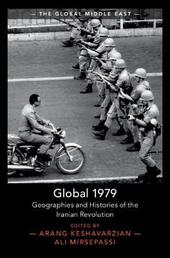
|
Global 1979: Geographies and Histories of the Iranian Revolution
Hardback
Main Details
| Title |
Global 1979: Geographies and Histories of the Iranian Revolution
|
| Authors and Contributors |
Edited by Arang Keshavarzian
|
|
Edited by Ali Mirsepassi
|
| Series | The Global Middle East |
|---|
| Physical Properties |
| Format:Hardback | | Pages:304 | | Dimensions(mm): Height 235,Width 158 |
|
| Category/Genre | Revolutions, uprisings and rebellions |
|---|
| ISBN/Barcode |
9781108839075
|
| Classifications | Dewey:955.0542 |
|---|
| Audience | | Tertiary Education (US: College) | | Professional & Vocational | |
|---|
| Illustrations |
Worked examples or Exercises
|
|
Publishing Details |
| Publisher |
Cambridge University Press
|
| Imprint |
Cambridge University Press
|
| Publication Date |
15 July 2021 |
| Publication Country |
United Kingdom
|
Description
The Iranian revolution of 1979 not only had an impact on regional and international affairs, but was made possible by the world and time in which it unfolded. This multi-disciplinary volume presents this revolution within its transnational and global contexts. Moving deftly from the personal to the global and from the provincial to the national, it draws attention to the multiplicity of spaces of the revolution such as streets, schools, prisons, personal lives, and histories such as the Cold War and Global 1960s and 70s. With a broad range of approaches, Global 1979 conceives of the Iranian Revolution not as exceptional or anachronistic, but as an uprising constituted by multiple, interwoven geographies and histories, which disrupt static and bounded notions of the local, national, regional, and global.
Author Biography
Arang Keshavarzian is Associate Professor of Middle Eastern and Islamic Studies at New York University. He is the author of Bazaar and State in Iran: The Politics of the Tehran Marketplace (2009). His articles have been published in journals including Politics and Society, International Journal of Middle East Studies, Geopolitics, Economy and Society, and the International Journal of Urban and Regional Research. He is currently a member of the editorial committee of Middle East Report and MERIP. Ali Mirsepassi is the Albert Gallatin Research Excellence Professor of Middle Eastern and Islamic studies at Gallatin and in the Department of Middle Eastern and Islamic Studies at New York University. In addition, he is the director of Iranian Studies Initiative and affiliated faculty at the NYU Sociology department. From 2007 to 2009, he was a Carnegie Scholar. He is the co-editor, with Arshin Adib-Moghaddam, of The Global Middle East, a book series published by Cambridge University Press. His most recent publication is Iran's Quiet Revolution: The Downfall of the Pahlavi State (2019).
Reviews'Serious scholarship perceives revolution as a fundamentally international or 'inter-social' process. Yet rarely are revolutions narrated as such. This important collection brings together valuable studies that uncover the overlooked global dimension of the Iranian revolution of 1979. Empirically rich and conceptually insightful, Global 1979 offers a perspective that presents revolution as a complex interplay of transnational effects and local experiences of perceived and real injustice.' Asef Bayat, University of Illinois, Urbana-Champaign 'Highly original, theoretically sophisticated and meticulously researched, the contributions collected here represent a major breakthrough in scholarly efforts to understand the enigma of the 1979 revolution in Iran.' Stephanie Cronin, University of Oxford 'Transcending scholars' focus on causes and outcomes of 1979, this volume simultaneously de-exceptionalizes the revolution and illuminates its specifically Iranian mix of global backgrounds, relationships, and imaginations. Wonderful chapters covering a boy from a small town, the Fedai's Iranization of Brazilian insurgency, Takhti's 1968 funeral, and the IRGC's regional guerilla dimension will inspire Iranian and global historians alike.' Cyrus Schayegh, Graduate Institute of International and Development Studies
|